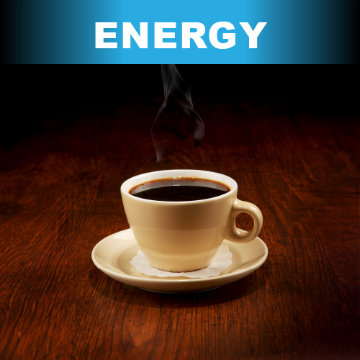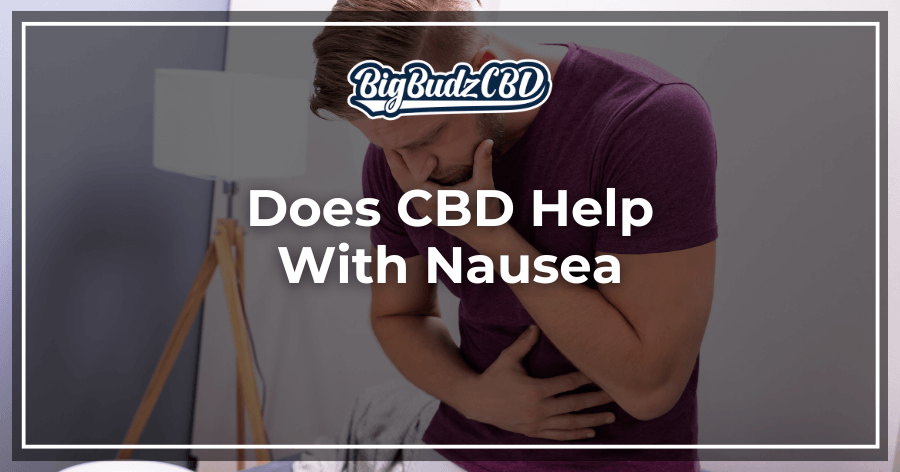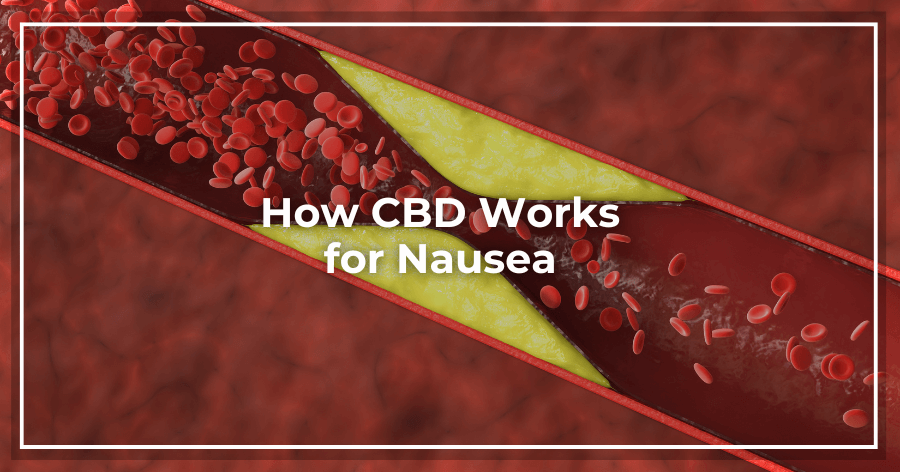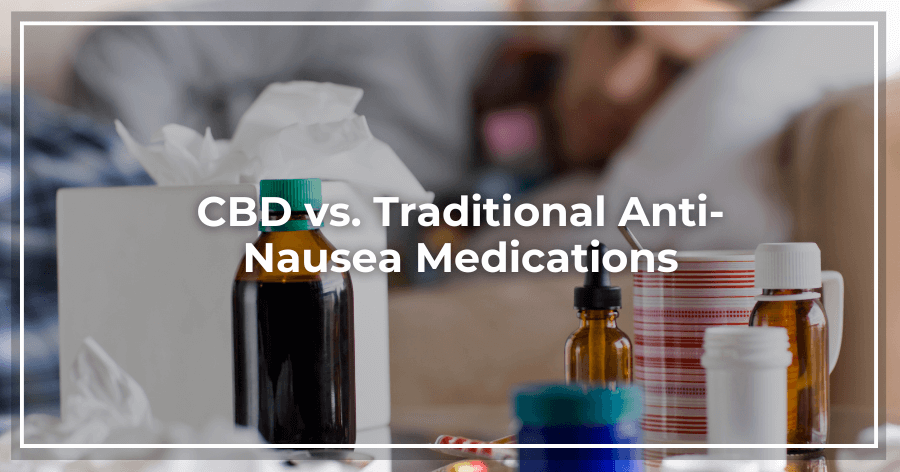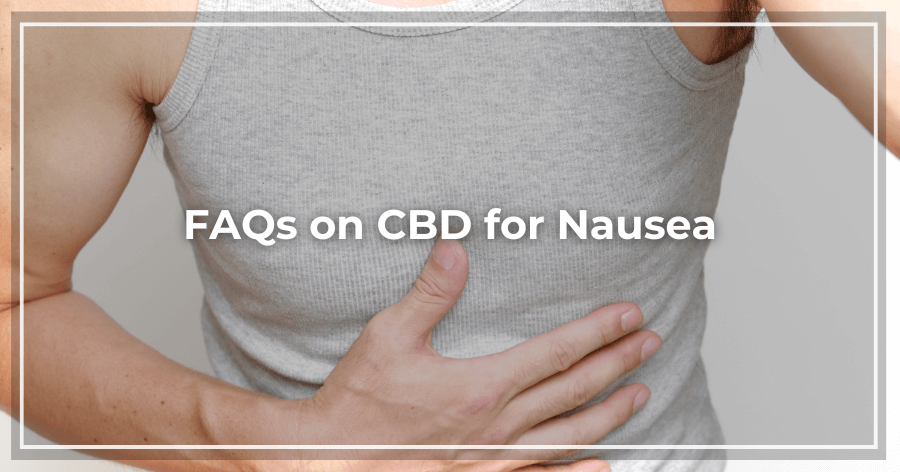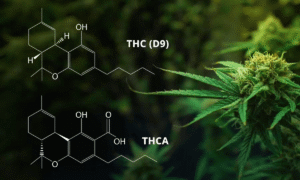So, you’ve likely asked yourself: “Does CBD help with nausea?”
Let’s be real. If you’ve ever been hit with nausea, whether from motion sickness, chemo, a bad stomach bug, or even that queasy feeling after a night out, you know how miserable it can be.
It sneaks up on you and throws your whole day off. At that point, you’re probably ready to try anything for relief.
Well, good news! CBD might just be the natural remedy you’re looking for.
Unlike popping pills or using traditional anti-nausea meds with all their weird side effects, CBD offers a more natural way to soothe that uncomfortable feeling in your stomach.
It works with your body’s systems in ways that some researchers believe can directly target the causes of nausea, whether you’re dealing with a random bout or something more serious like chemotherapy-induced nausea.
CBD’s rising popularity isn’t just about pain relief or anxiety; its potential as an anti-nausea solution is catching attention fast.
How CBD Works for Nausea
CBD, or cannabidiol, is the non-psychoactive part of cannabis.
Unlike THC, CBD doesn’t get you high.
What it does do is interact with your body’s endocannabinoid system (ECS), specifically the CB1 receptors, which play a role in controlling nausea and vomiting.
By affecting these receptors, CBD has shown potential to help curb the nausea feelings—whether it’s from an upset stomach, motion sickness, or even nausea caused by chemo treatments.
In fact, it’s the anti-nausea effects of CBD that have people talking.
This isn’t just hype either.
Some studies suggest CBD can reduce vomiting and nausea by regulating your ECS.
CBD vs. Traditional Anti-Nausea Medications
A lot of anti-nausea medications come with their own baggage, like dry mouth, dizziness, or worse: even more nausea.
If you’ve been down that road, you know how frustrating it is.
CBD offers an alternative.
It’s seen as a natural remedy with fewer side effects, which is why more folks are giving it a try for things like chemotherapy-induced nausea or gastrointestinal distress.
That said, it’s not a miracle cure. Always consult your doctor first, especially if you’re dealing with something serious like chemotherapy or chronic conditions.
Some side effects of CBD to watch for are dry mouth, appetite changes, and mild discomfort if you go overboard on the dose.
Types of CBD Products for Nausea
Not all CBD is created equal. Depending on the severity of your nausea, you may want to choose different forms of CBD. Here are some options:
- CBD Oils: Easy to use. You can take a few drops under the tongue for quick absorption. CBD Pills are also a convenient option if you’re into capsules.
- CBD Gummies: Tasty, fun, and discreet, but they take longer to kick in. If you’ve got mild nausea and don’t mind the wait, CBD Gummies could be your go-to.
- CBD Vapes: These deliver fast relief but aren’t for everyone. Vaping CBD allows the compound to get into your system quicker than other methods, which is why people with severe nausea might opt for it. If you prefer this, check out CBD Vape Cartridges.
- CBD Smokables: Another fast option that some swear by. CBD Smokables can offer relief within minutes.
It’s all about what works best for you.
How Much CBD Should You Take for Nausea?
Dosing is a tricky thing because it varies from person to person.
What works for one might not work for you.
A general rule is to start with a low dose (like 5-10mg) and see how your body reacts.
You can gradually increase it until you find the sweet spot.
For nausea, smaller doses might be all you need.
Make sure you’re using high-quality CBD products that are tested for harmful contaminants.
Cheap CBD could make your symptoms worse. Stick to trusted products with a good rep.
FAQs on CBD for Nausea
Does CBD help with severe nausea?
Yes, CBD has been reported to help with severe nausea, especially in cases like chemotherapy-induced nausea.
Keep in mind, it’s not a replacement for traditional treatment but can be an addition to your regimen.
Are there side effects of using CBD for nausea?
While CBD is generally safe, some side effects include dry mouth, dizziness, or changes in appetite.
It’s rare, but people can also experience diarrhea. Always start with a low dose and watch for any adverse effects.
Does CBD calm an upset stomach?
Some people report that CBD helps alleviate gastrointestinal discomfort, such as nausea and upset stomach.
How CBD Might Help an Upset Stomach:
- Interaction with the Endocannabinoid System: CBD interacts with the body’s endocannabinoid system (ECS), which plays a role in regulating various physiological processes, including digestion. By modulating the ECS, CBD may help balance digestive functions.
- Anti-Inflammatory Effects: CBD has anti-inflammatory properties that could reduce inflammation in the gut, potentially easing symptoms like cramping and discomfort.
- Influence on Serotonin Receptors: CBD may affect serotonin receptors, which are involved in regulating mood and gastrointestinal activity. This interaction might help reduce nausea.
What the Research Says:
- Limited Human Studies: Most of the research on CBD and gastrointestinal issues is preliminary and often based on animal studies or small human trials. Comprehensive clinical studies are lacking.
- Symptom Relief: Some studies suggest that CBD could help alleviate symptoms of conditions like irritable bowel syndrome (IBS) and inflammatory bowel disease (IBD), but more research is needed to confirm these effects.
Considerations and Precautions:
- Consult a Healthcare Professional: Before using CBD for an upset stomach, it’s important to speak with a doctor, especially if you’re taking other medications, as CBD can interact with certain drugs.
- Product Quality: The CBD market is largely unregulated, so product quality can vary. Look for products that have been third-party tested for purity and potency.
What CBD is best for stomach issues?
When considering CBD products for stomach issues, it’s important to choose a form that suits your needs and is of high quality. Here are some options that people often use for gastrointestinal discomfort:
- CBD Oil Tinctures: These are liquid extracts that you can take sublingually (under the tongue) or add to food and drinks. Tinctures allow for adjustable dosing and are absorbed relatively quickly into the bloodstream.
- CBD Capsules: Capsules provide a convenient and tasteless way to consume CBD. They have pre-measured doses, but since they pass through the digestive system, they may take longer to take effect compared to tinctures.
- CBD Edibles: Gummies and other edibles are easy to consume but also require digestion before the CBD is absorbed, leading to a delayed onset of effects.
- Water-Soluble CBD: This form is designed to mix easily with liquids and may offer improved absorption rates, potentially providing quicker relief.
- Full-Spectrum vs. Isolate:
- Full-Spectrum CBD contains all the naturally occurring compounds in the cannabis plant, including trace amounts of THC (less than 0.3%). Some believe this combination enhances the therapeutic effects, known as the “entourage effect.”
- CBD Isolate is pure cannabidiol without other cannabinoids or terpenes. It’s an option if you want to avoid THC altogether.
Considerations When Choosing a CBD Product:
- Quality and Purity: Opt for products that are third-party tested to ensure they are free from contaminants and accurately labeled regarding CBD content.
- Dosage: Start with a low dose and gradually increase it to monitor how your body responds. Consult a healthcare professional for personalized dosing guidance.
- Legality and Regulations: Ensure that the CBD product complies with local laws and regulations, especially concerning THC content.
- Potential Interactions: If you’re taking other medications, discuss with your doctor whether CBD could interact with them.
Note: Research on CBD’s effectiveness for stomach issues is still ongoing, and individual experiences may vary. It’s important to consult a healthcare provider before starting any new supplement, including CBD, to address gastrointestinal concerns.
Is CBD good when you are sick?
Some people consider using CBD to alleviate symptoms when they’re feeling unwell. Here’s what is currently known:
Potential Benefits of CBD When Sick:
- Pain Relief: CBD may help reduce pain by interacting with the body’s endocannabinoid system, which plays a role in regulating pain responses.
- Anti-Inflammatory Effects: Inflammation is a common response to illness. CBD has shown anti-inflammatory properties in some studies, which might help in reducing inflammation-related symptoms.
- Nausea and Appetite: Some research suggests that CBD could help alleviate nausea and improve appetite, which can be beneficial when you’re sick.
- Anxiety and Sleep: Illness can often lead to anxiety or disrupted sleep. CBD may have calming effects that help improve sleep quality and reduce anxiety levels.
Limitations and Considerations:
- Limited Scientific Evidence: While preliminary studies are promising, comprehensive clinical trials in humans are limited. More research is needed to confirm CBD’s efficacy and safety for treating illness-related symptoms.
- Interaction with Medications: CBD can interact with certain medications, potentially altering their effectiveness or causing side effects. This is especially important if you’re taking prescription drugs.
- Side Effects: Some people may experience side effects from CBD, such as dry mouth, drowsiness, or changes in appetite.
- Product Quality: The CBD market is not strictly regulated, so the quality and purity of products can vary. It’s important to choose products that have been third-party tested.
Recommendations:
- Consult a Healthcare Professional: Before using CBD when you’re sick, it’s crucial to speak with a healthcare provider. They can offer personalized advice based on your health history and current medications.
- Start Low and Go Slow: If you decide to use CBD, start with a low dose to see how your body reacts, and adjust as needed under professional guidance.
- Legal Considerations: Ensure that CBD is legal in your area and that you’re purchasing it from reputable sources.
Is CBD or CBG better for nausea?
While both CBD and CBG show potential in relieving nausea, current research does not provide enough evidence to declare one superior to the other.
CBD is more widely studied and may offer benefits for nausea through its interaction with serotonin receptors.
CBG is promising but requires more scientific investigation.
Consulting a healthcare provider is essential to determine the most appropriate and safe option for managing nausea based on your individual needs and health status.
Can I use CBD for nausea from motion sickness?
Yes, some people find relief from motion sickness with CBD.
Since it interacts with the ECS to reduce nausea, it might help you keep things under control.
How fast does CBD work for nausea?
This depends on how you take it. Vaping or smoking CBD offers the fastest relief, typically within minutes.
CBD oils taken sublingually work in 15-30 minutes, while edibles like CBD gummies can take up to an hour or more to kick in.
Should I avoid CBD if I have cannabis hyperemesis syndrome?
If you’ve been diagnosed with cannabis hyperemesis syndrome, you should avoid all cannabis products, including CBD.
This condition can cause severe vomiting, abdominal pain, and nausea.
Key Takeaways & Conclusion
CBD might be your secret weapon against nausea.
Whether it’s from chemo, an upset stomach, or motion sickness, cannabidiol is showing promise in helping people feel better.
Start with small doses, choose a quality product, and see how your body reacts.
Ready to try CBD for nausea? Check out our full range of products—from CBD oils to vape cartridges.


















